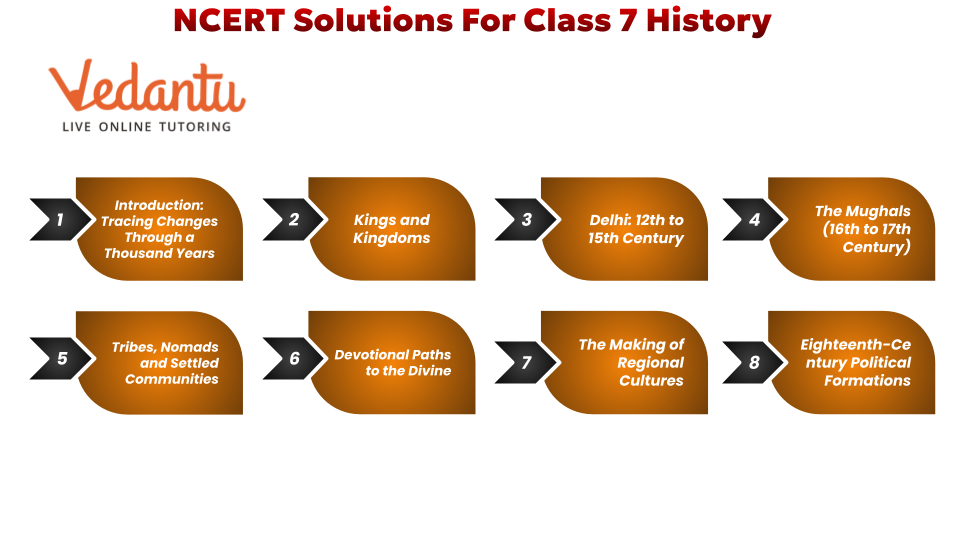Chapter-wise Class 7 Social Science Our Pasts 2 Questions and Answers Free PDF Download
FAQs on NCERT Solutions For Class 7 Social Science Our Pasts 2 All Chapters - 2025-26
1. How do the NCERT Solutions for Class 7 Social Science History benefit my exam preparation for the 2025-26 session?
The NCERT Solutions for Class 7 Social Science History for the 2025-26 session are designed to provide comprehensive support for your exam preparation. They offer:
- Step-by-Step Answers: Each question from the textbook is solved with a detailed, step-by-step method, making it easy to understand the logic behind the answer.
- Conceptual Clarity: The solutions break down complex historical events and concepts, helping you build a strong foundational understanding.
- Exam-Oriented Approach: Answers are structured as per the CBSE guidelines, teaching you how to write high-scoring responses in your exams. For a complete overview, you can refer to the main NCERT Solutions for Class 7 Social Science page.
2. What are the chapters covered in the NCERT Solutions for Class 7 History 'Our Pasts - II'?
The NCERT Solutions for the Class 7 History textbook, 'Our Pasts - II', cover all chapters as per the latest CBSE syllabus. The list of chapters includes:
- Chapter 1: Tracing Changes Through a Thousand Years
- Chapter 2: New Kings and Kingdoms
- Chapter 3: Delhi: 12th to 15th Century
- Chapter 4: The Mughals (16th to 17th Century)
- Chapter 5: Tribes, Nomads, and Settled Communities
- Chapter 6: Devotional Paths to the Divine
- Chapter 7: The Making of Regional Cultures
- Chapter 8: Eighteenth-Century Political Formations
You can start by exploring the detailed solutions for Chapter 1 Tracing Changes Through a Thousand Years.
3. How should I effectively use Vedantu’s NCERT Solutions for Class 7 History?
To use the NCERT Solutions most effectively, follow this approach:
- First, thoroughly read the relevant chapter from your 'Our Pasts - II' textbook.
- Next, attempt to answer the exercise questions on your own. This helps you identify areas where you lack clarity.
- Finally, refer to Vedantu’s solutions to verify your answers, understand the correct answering method, and clarify any doubts. This process ensures active learning and better retention. Vedantu provides comprehensive NCERT Solutions for all Class 7 subjects to support this learning method.
4. How are the NCERT Solutions for each chapter of 'Our Pasts - II' structured on Vedantu?
The solutions are structured to mirror the exercises in the NCERT Class 7 Social Science textbook. They provide clear, sequential answers for all sections, including 'Let's recall', 'Let's discuss', 'Let's understand', and 'Let's do'. This ensures that you can easily find the solution for a specific question you are working on and understand how to tackle different types of questions as per the CBSE pattern. You can refer to the NCERT Class 7 Social Science Book to see the exercise structure.
5. Beyond direct answers, how do these solutions explain the rise and fall of dynasties like the Mughals and the Delhi Sultanate?
Vedantu's NCERT Solutions do more than just provide answers. For topics like the Mughal Empire or the Delhi Sultanate, the answers are crafted to provide historical context. They explain the cause-and-effect relationships, administrative policies, and socio-economic conditions that led to the rise and eventual decline of these powerful dynasties. This helps you build a narrative understanding of history rather than just memorising facts. For instance, the solutions for the Mughal chapter detail their administrative achievements and the factors behind their consolidation of power.
6. Why is it important to follow the method in the NCERT Solutions when answering questions about administration or architecture in Class 7 History?
Following the step-by-step method provided in the NCERT solutions is crucial because marks in exams are often awarded for specific key points and a well-structured answer. For questions on Mughal administration or temple architecture, the solutions demonstrate how to present information logically, cover all essential details required by the curriculum, and use correct historical terminology. This ensures you write complete answers that are likely to score full marks. Practising with important questions can further refine this skill.
7. How do the NCERT Solutions for 'Our Pasts - II' clarify complex historical terms found in the exercises?
The NCERT Solutions for 'Our Pasts - II' are designed to make difficult concepts accessible. When a question involves a complex historical term like 'prashastis', 'manuscripts', or 'iqtadar', the answer explains the term within its historical context. This approach helps you not only to understand the direct answer but also to build a strong vocabulary of historical terms, which is essential for Class 7 Social Science.
8. How can I integrate the NCERT Solutions for History with Geography ('Our Environment') to better understand the Class 7 syllabus?
Integrating History and Geography solutions provides a more holistic understanding. Historical events are often shaped by geographical factors. For example, by using both sets of solutions, you can understand how the location of a kingdom (from History) was influenced by its proximity to rivers, trade routes, or natural resources (from Geography). This interdisciplinary approach helps in writing more nuanced and comprehensive answers, connecting why empires flourished in certain regions, as explained in the NCERT Solutions for Geography.

























